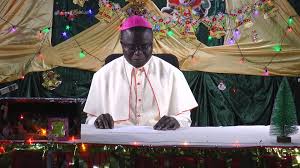
For the Son of God was born at Christmas for each and every one of us and he is identified and presented to us in Mt. 1:23 as our Emmanuel, that is, God-with-us. Unfortunately for personal and other reasons, not all of us may be disposed, enlightened, and opportuned to really sense and understand that God is closely and fully with us in the Child Jesus regardless of our experience and condition in life. Those who are preoccupied with the daily needs and struggles of life, for instance, may not fully experience God’s active presence and power in their lives. His blessings, goodness, and generosity may not also be real for those who are frustrated and desperate because their hopes and prayers are not realized. Some of us may also have questioned God’s power and presence in our lives during this Covid – 19 pandemic when we experienced sorrow, pain, disappointment, and doubt. Our faith and trust in God’s saving power was tested in these times of need, fear, and suffering when God seemed to be far away, absent, and indifferent to our situation in life. The Christmas message I, therefore, want to deliver to each and every one of us is: God is with us in the Child Jesus – He is our Emmanuel. So we should always trust in him and be fully united with him.
Throughout their journey and experience in life, God was constantly with his chosen people in the Old Testament to save, protect, inspire, and support them with his presence, blessings, and gifts. He never abandoned them or ignored their situation even when they were defeated by their enemies and were living in exile. For God was committed to his solemn promise and covenant with them that he will be their God and they shall be his faithful people. When Jacob had a vision of God during his flight from Canaan in Gen. 28:15-16, God assured him that he is with him. He will keep him wherever he goes and bring him back to the land. Then Jacob realized that God was with him without him knowing it. In Elijah’s case in 1Kgs. 19:11-14, he experienced God’s presence in a gentle breeze on Mount Horeb and God instructed him on what he should accomplish as his chosen prophet. God was also with his people in the book of Zeph. 3:17 as a warrior who gave them victory and renewed them in his love. The psalmist was, therefore, convinced in Ps. 46:5-7, 10-11 that God was in their midst; that the Lord of Hosts was with them and the God of Jacob was their stronghold. This clearly proves that God was always with his chosen people both in times of uncertainty, isolation, and success. But his presence and power among his chosen people was not as personal, human, tangible, intimate, and close as his presence to them in the Child Jesus, the incarnate Word of God who was born of the Virgin Mary at Christmas.
The Child Jesus was fully God and truly alive, active, and present among his chosen people. He was the final and perfect revelation of God’s nature, identify, image, and love for them. So God was no longer invisible, inaccessible, and indifferent towards his people. He was personally visible and living among his chosen people in the Child Jesus. There was no reason, on their part, not to recognize, affirm, and cherish God’s presence, power, and love in Christ Jesus. Unfortunately, we are told in Jn. 1:11-12 that “he came to his own home, and his own people did not receive him. But to all who received him, who believed in his name, he gave power to become children of God.” This statement perfectly summarized what Jesus, the Son of God painfully endured among God’s chosen people but it also reveals what he was able to accomplish for those who believed and received him. He enabled them to become children of Godby sharing his divine life with them. The importance of recognizing, believing, and receiving the Child Jesus who is now present in our midst is highly emphasized in this statement. If we accept and experience his presence among us as God-with-us, he will also share his divine life with us and we will become God’s children. We should not, therefore, be like God’s chosen people in the past who could not recognize and respond to Jesus as the perfect revelation and embodiment of God’s presence, saving power, and love in their midst.
In both the Scriptures and the Church’s liturgy at this time, Jesus is explicitly and implicitly portrayed and considered as God-with-us, that is, our Emmanuel. When his birth was foretold in Isa. 7:14-17, it was stated that a virgin shall conceive and give birth to a Son who shall be called Emmanuel which was interpreted as God-with-us. What was, therefore, known and expected about the savior of God’s chosen people when he was first announced to them was: he will be their Emmanuel, that is, God with them. This fact or reality was what Gabriel, the Archangel confirmed to Joseph in a dream in Mt. 1:20-24. The archangel persuaded Joseph to take Mary home as his wife because the child she conceived was in fulfilment of Isaiah’s prophecy. He will, therefore, be called Emmanuel which means God-with-us. The same conviction was what St. John expressed in his Gospel. He testified in Jn. 1:14 that, “the Word became flesh and dwelt among us, full of grace and truth and we saw his glory; the glory of the only Son from the Father.” In this verse, the Evangelist did not specifically mention Emmanuel but he clearly affirmed the existence of the incarnate Word of God among his people and their recognition of his identity and glory as the Son of God. This is precisely what we too should do during this Season of Christmas. We should testify that God dwells and lives with us in the Child Jesus as the incarnate Word of God. The popular liturgical song of the Church at Christmas, that is, ‘O Come O Come Emmanuel’ rightly invites us to “rejoice, rejoice, for Emmanuel who is God-with-us shall come to us and live with us in our situation in life.
Jesus fully shares our human condition, experiences, concerns, and hopes in life as God-with-us because he is completely human and alive like each and every one of us. St. Paul testified in Phil. 2:7-8 that “Jesus emptied himself and took the form of a servant being born in the likeness of men. And being found in human form, he humbled himself and became obedient unto death even death on a cross.” So God is not just with us in the Child Jesus in a passive and insensitive way as if he is a stranger or extraordinary being in our midst. God is actively with us in Jesus as one like us who equally shares our human condition of joy, suffering, weakness, poverty, and rejection. The Child Jesus, therefore, understands our needs and concerns and cares about us in our particular state in life. This should encourage and motivate us during this Christmas Season and also in times of trial and uncertainty. We should believe that God is with us in Jesus Christ and he shares and bears our human burden, suffering, needs, and hopes. Otherwise, we will assume that we are alone in our current situation and God in Christ Jesus does not care about us in our need. Our experience of pain, isolation, and suffering during this pandemic is equally shared by Jesus our Emmanuel because he is God-with-us.
Since God abides with us in the Child Jesus, it means that each and every one of us is accompanied and guided by God in our vocation, mission, and journey in life. God now guides us through Jesus as he guided and accompanied his chosen people in the past. We have, on our part, to dispose ourselves to be led, guided, and supported in our vocation and journey of faith by Jesus, the incarnate Word of God who came to show us the way to our heavenly Father. Like the three wise men from the East who were guided by the bright Star, we should also be willing and open to be directed by the bright light of Jesus that has now scattered the darkness of our world. We should not, therefore, depend or rely so much on ourselves, our knowledge, and strength if we believe that Jesus is God-with-us. He clearly said in Mt. 28:20 that he is with us always until the end of time. So there is no moment and circumstance in life when God is not with us in Jesus Christ to support and enlighten us, especially, in times of difficulty and doubt. What we, therefore, need to do during this Christmas Season is to renew and reaffirm our faith and hope in God who he is indeed with us in the Child Jesus. God will equally not disappoint or fail us in our vocation, efforts, and struggles in life.
God is absolutely with us as our Emmanuel in our homes, schools, business, places of work, and society in which we live and experience the challenges of life. We should equally celebrate the feast of Christmas in a spirit of joy, gratitude, and adoration to God who is with us now, in order to, bear our human weakness and guide us in our daily tasks and trials in life. Our celebration of the feast of Christmas should, therefore, be based on our personal conviction and faith in God’s power and presence among us in the Child Jesus. Otherwise, we will celebrate Christmas simply as a mere annual festive occasion without recognizing the living, active, and personal presence of God among us in the Child Jesus. For, Christmas is ultimately the feast of the birth of Christ, our Emmanuel who is God-with-us. This sense of Christmas is important and relevant for us today in light of our experience of life during this Covid – 19 pandemic. So if we had any doubts, we are now assured that God is with us, is like us in all things but sin, and lives forever among us. We have no reason, in that case, to be afraid, lonely, disappointed, and saddened by our experience in life. Instead, we should be inspired, motivated, confident, and hopeful in all circumstances because God is in solidarity with us in his Son, Jesus Christ. Our protection, peace, and well-being are, therefore, assured because God is with us and for us. Nothing will equally be against us that is greater and more powerful than God.
In conformity with the Covid – 19 Measures and Regulations for the Celebration of Masses and other Sacraments in the Diocese of Banjul, the feast of Christmas and other feasts within the Christmas Season will not be celebrated in a merry, festive, and social manner as we have done in previous years. The priests, religious, and lay faithful of the Diocese are, therefore, required to strictly observe and implement these Measures and Regulations for the health and safety of all. This should not prevent all of us believers in Christ to internalize and cherish the spirit of this special season of the Church’s liturgical year, be conscious of God’s presence with us in Jesus, our Emmanuel, and appreciate its significance for us. We normally present and exchange gifts with our relatives, friends, and neighbors including our Muslim brothers and sisters; we visit each other and express our joy in our homes, and we organize social events for our associates. But due to the Corona Virus pandemic, we should rather, pray for one another, be in spiritual communion and solidarity with each other, especially, the needy and afflicted, and become agents of Christ’s peace, joy, and love in our society. As the Catholic Bishop of the Diocese of Banjul, I take this golden opportunity to wish the priests, religious, lay faithful, all believers in Christ, our Muslim friends and believers of other faiths, and all Gambians at home and abroad a peaceful, joyful, inspiring, and meaningful celebration of the birth of Jesus who is God-with-us.
Yours in Christ,
+Most Rev. Dr. Gabriel Mendy C.S.Sp.
Catholic Bishop of the Diocese of Banjul, The Gambia.





